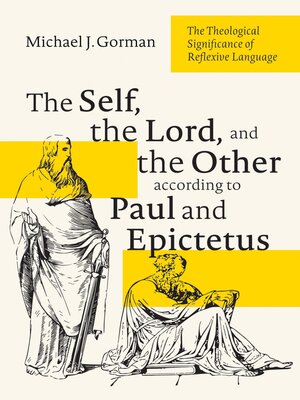The Self, the Lord, and the Other according to Paul and Epictetus
ebook ∣ The Theological Significance of Reflexive Language
By Michael J. Gorman

Sign up to save your library
With an OverDrive account, you can save your favorite libraries for at-a-glance information about availability. Find out more about OverDrive accounts.
Find this title in Libby, the library reading app by OverDrive.



Search for a digital library with this title
Title found at these libraries:
| Library Name | Distance |
|---|---|
| Loading... |
This study explores the relationship between the individual person (the self), the divine, and other people in the writings of the apostle Paul and the Roman Stoic Epictetus. It does so by examining self-involving actions expressed with reflexive pronouns (myself, yourself, etc.) in various kinds of sentences: for example, "Examine yourself" and "You do not belong to yourself." After situating the topic within the fields of linguistics and ancient Greek, the study then examines the reflexive constructions in Epictetus's Discourses, showing that reflexive texts express fundamental aspects of his ethic of rational self-interest in imitation of the indwelling rational deity. Next, the investigation examines the 109 reflexive constructions in Paul, providing an exegesis of each reflexive text and then synthesizing the results. Paul's reflexive phrases are essential statements of his theology and ethics, expressing an interconnected narrative Christology, narrative apostolic identity, and narrative ethic. Most importantly, the study finds that for Epictetus, concern for others is a rational means to self-realization, whereas for Paul, concern for others is a community ethic grounded in the story of the indwelling Christ and is the antithesis of self-interest.







